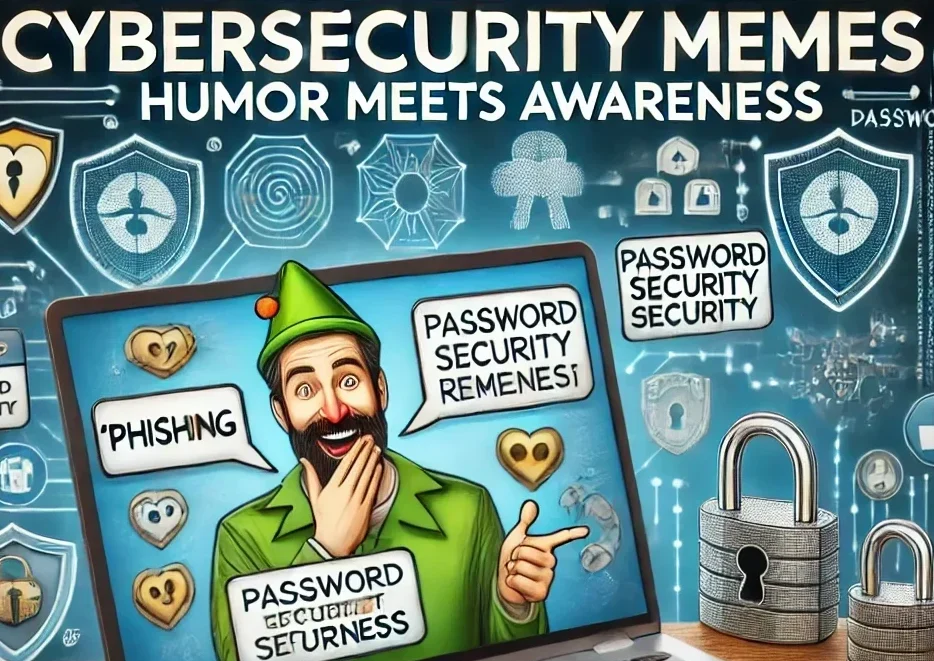
Introduction: The Role of Humor in Cybersecurity
In the world of cybersecurity, discussions often focus on complex technologies and high-stakes risks. Memes in the cybersecurity realm have emerged as a unique medium that combines humor with education. They simplify tough concepts, raise awareness, and build a sense of community among professionals. This article explores how memes play a role in the cybersecurity landscape and how they are more than just jokes—they serve as a tool for spreading crucial information.
What Are Cybersecurity Memes?
Definition and Origin of Memes in Tech Culture
Memes are images, videos, or text that convey a humorous or satirical message. In cybersecurity, memes focus on topics like data breaches, phishing, and password hygiene. Originating from internet culture, they have become an integral part of online communities.
Importance of Humor in Cybersecurity
Memes serve as a tool to simplify complex cybersecurity concepts. They are widely shared across platforms like Reddit, Twitter, and professional forums, helping to foster a sense of camaraderie among IT and security professionals.
How Memes Improve Awareness
Simplifying Cybersecurity Concepts Through Humor
Memes can break down technical jargon into relatable scenarios. For example, a meme about “phishing” illustrates how easily people can be tricked by fake emails. They make learning about digital security more engaging and accessible.
Popular Memes and Their Messages
- “This is fine” dog meme: Represents a common response to ongoing data breaches.
- “One does not simply…”: Highlights the challenges of securing systems against cyber threats.
- “Security team be like…”: Reflects the daily struggles of IT teams handling security incidents.
The Role of Social Media in Meme Distribution
Platforms like Reddit (e.g., r/CybersecurityMemes) and Twitter (@SwiftOnSecurity) are popular for sharing security-related humor. Memes on these platforms often go viral, reaching audiences beyond the technical community. Corporate accounts of cybersecurity firms also use this content to connect with users.
Key Trends in Memes Related to Cybersecurity
Recurring Themes in Memes
- Password Security: Jokes about weak passwords like “password123” emphasize the importance of strong credentials.
- Phishing Attempts: Memes about obvious phishing emails highlight the need for user vigilance.
- Data Breaches: Commentaries on recent breaches offer humorous takes on serious security lapses.
- Network Security Humor: Memes about firewalls, VPNs, and insider threats resonate with IT teams.
Memes Reflecting Real-World Security Events
Humor often emerges in response to high-profile data breaches and ransomware attacks. For example, after a major breach, the internet fills with memes critiquing the affected company’s security practices. This humor fosters discussions about best practices in a relatable way.
For more interesting blogs, visit our site: https://futuretrendz.co.uk/
Using Memes for Security Training
Memes as Tools for Engaging Training Sessions
Humor can make training sessions less monotonous and more engaging. Memes are often used to introduce topics like phishing, password management, and social engineering, serving as icebreakers that help employees retain important security information.
Case Study: Memes in Awareness Campaigns
Several organizations have incorporated humor into their security awareness campaigns. This method has proven effective during events like Cybersecurity Awareness Month, leading to increased engagement. Memes about phishing simulations, for example, remind employees to be cautious when they receive suspicious emails.
The Dark Side of Memes in Cybersecurity
How Hackers Use Memes for Malicious Purposes
Some cybercriminals use humorous images as a covert method of communication on the dark web. Hidden messages or encoded commands can be embedded in meme images, making them difficult to detect. This tactic can bypass traditional security measures, highlighting the importance of understanding digital media.
Memes and the Spread of Disinformation
Certain memes spread misinformation about cybersecurity practices, such as portraying specific antivirus software as ineffective. These can lead to poor security habits if taken seriously. It is crucial for professionals to verify the accuracy of the information shared through these channels.
Key Influencers and Platforms for Memes in Cybersecurity
Notable Figures in the Meme Space
- @SwiftOnSecurity (Twitter): Blends humor with valuable insights into information security.
- r/CybersecurityMemes (Reddit): A hub for sharing and discussing memes about cybersecurity.
- Corporate Accounts: Companies like Kaspersky and Norton use humor to engage with their followers and promote security practices.
For more interesting blogs, visit our site: https://futuretrendz.co.uk/
The Role of Online Communities in Spreading Humor
Communities on Reddit and Twitter often serve as incubators for new meme formats. Security professionals use these platforms to share their experiences through humor, reflecting the frustrations and challenges of maintaining security in a fast-paced digital world.
FAQs About Memes in the Cybersecurity World
Why are these memes popular?
They resonate because they offer a humorous perspective on complex security issues, making the content more accessible and relatable.
How can humor improve awareness?
Memes simplify complicated topics, making it easier for non-technical audiences to understand and retain security practices.
Are there risks associated with sharing memes?
Yes, some can spread misinformation or be used for malicious purposes, such as encoding hidden messages.
Where can I find these memes?
Popular platforms include Reddit (r/CybersecurityMemes), Twitter accounts like @SwiftOnSecurity, and various cybersecurity blogs.
Can humor be used effectively in corporate training?
Yes, integrating memes into training can make sessions more engaging and help employees better understand and remember security protocols.
Conclusion: Balancing Humor with Seriousness in Cybersecurity
Memes play a crucial role in raising awareness, educating the public, and creating a community among professionals. While they are entertaining, they also provide valuable insights into the challenges faced in the digital security landscape. By simplifying complex concepts, memes help make cybersecurity more approachable, especially for non-experts. However, it’s important to strike a balance—leveraging humor without downplaying the seriousness of cyber threats. As new challenges like AI and deepfakes emerge, the world of cybersecurity humor will continue to adapt, offering fresh ways to engage and educate the community.
For more interesting blogs, visit our site: https://futuretrendz.co.uk/







